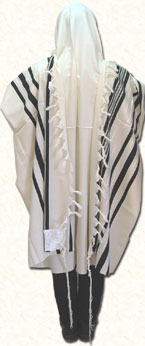 Even though the ordinary Israeli who attends synagogue does not even own a necktie, a social scientist has "proven" that "Israeli Jewish adults attending synagogue 'happy and healthier'"
Even though the ordinary Israeli who attends synagogue does not even own a necktie, a social scientist has "proven" that "Israeli Jewish adults attending synagogue 'happy and healthier'"In fact the researcher involved already knew the answers before he even conducted his "studies." Professor Jeff Levin has spent his career "proving" the health benefits of religion for the world. There is zero chance at this stage of the game that he would come up with a conclusion to disprove his base assumptions.
We are shocked by this discovery though for a specific reason. We've been criticized for discussing in our "Dear Rabbi" column a rule requiring tie-wearing by Jews in a local synagogue if they want to receive a Torah-honor on Sabbaths and Holidays.
Here's a nugget from a letter to the editor of the Jewish Standard that fervently defends the wonderful meaning of the tie-wearing practice by Dr. Reuben Gross:
Rabbi Zahavy takes a strong stand with the congregant. He labels the shul’s dress code as “nonsense.” This is hardly appropriate language coming from a rabbi about a shul’s policy, which follows the dictates of no less a person than the prophet Ezra (6th century BCE), who enacted the rule that individuals should give special “kavod” (honor) to the Sabbath, marked by their change of clothing.Truly we did not know that Ezra the Scribe (usually not called prophet) knew about neckties in the 6th century BCE.
And so we wonder how Jews in Israel who attend shul regularly can be happier and healthier even though they do not own or wear ties.
Or let's be positive here. Can you imagine just how happy and healthy these synagogue attenders would be in Israel if they wore neckties?
Perhaps we can start a new program to promote even greater health and happiness in Israel: Neckties Without Borders for Religious Sabras.
Here is a news report on the impressive research on the health benefits of attending synagogue:
Israeli Jewish adults, who go to synagogue regularly, pray often, and think of themselves as religious are much healthier and happier than their non-religious counterparts, two new studies have suggested.
Baylor University researcher Jeff Levin, Ph.D, said that commitment to Jewish religious belief and practice is strongly associated with greater physical and psychological well-being.
One study used 2010 data on 1,849 Jewish adults from the Israeli sample of the European Social Survey and has been published in Psychology of Religion and Spirituality, an official journal of the American Psychological Association.
The other study used 2009-10 data on 991 Jewish adults from the Israeli sample of the International Social Survey Programme's Religion III survey and has been published in the Journal of Happiness Studies. (ANI)






 Yes, the Supreme Court ruling on gene patenting is good for the Jews.
Yes, the Supreme Court ruling on gene patenting is good for the Jews. Yes. Hebrew National Hot Dogs have been kosher since 1905.
Yes. Hebrew National Hot Dogs have been kosher since 1905.
 Thirty years ago, in 1983 we were happy to start sending our women Jewish Studies major graduates at the University of Minnesota to train to become rabbis in the Reform movement. We told them to go out and become full head rabbis of synagogues, not assistants or educational directors. Some did. We were proud.
Thirty years ago, in 1983 we were happy to start sending our women Jewish Studies major graduates at the University of Minnesota to train to become rabbis in the Reform movement. We told them to go out and become full head rabbis of synagogues, not assistants or educational directors. Some did. We were proud. He was such a powerful acting persona, sure we'd like to claim him as a member of the tribe. But no James Gandolfini was not a Jew. Shockingly, he passed away at age 51. He was a superlative actor who made his biggest hit in the Sopranos on HBO, considered by many critics to be the greatest series of its kind of all time.
He was such a powerful acting persona, sure we'd like to claim him as a member of the tribe. But no James Gandolfini was not a Jew. Shockingly, he passed away at age 51. He was a superlative actor who made his biggest hit in the Sopranos on HBO, considered by many critics to be the greatest series of its kind of all time. From The New York Times, a poorly argued article,
From The New York Times, a poorly argued article,


 Day after day we see ill will and bad faith in the negotiations in our marketplace and workplace.
Day after day we see ill will and bad faith in the negotiations in our marketplace and workplace. Yes, famous economist Nouriel Roubini is a Jew.
Yes, famous economist Nouriel Roubini is a Jew. It happens. When you practice irrational thuggery in the name of religion it does not take long for an impressionable young person to get a really wrong idea. On the Daily Beast we read, "
It happens. When you practice irrational thuggery in the name of religion it does not take long for an impressionable young person to get a really wrong idea. On the Daily Beast we read, "

 The benefits of Jewish meditation are accessible to every type of Jew through acts of Jewish piety.
The benefits of Jewish meditation are accessible to every type of Jew through acts of Jewish piety. An Indian-American boy won the National Spelling Bee by correctly spelling a Yiddish word,
An Indian-American boy won the National Spelling Bee by correctly spelling a Yiddish word,